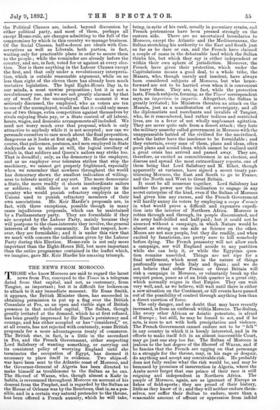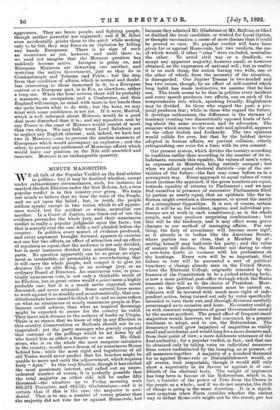THE NEWS FROM MOROCCO.
THOSE who know Morocco are said to regard the latest news from Fez, conveyed to the Times in a telegram dated from that capital, and not, as customary, from Tangier, as important; but it is difficult for lookers-on to attach to it any immediate moment. Sir Euan Smith, it appears, the British Minister there, has succeeded in obtaining permission to put up a flag over the British Consulate at Fez, as an open and visible sign of British presence in that secluded capital. The Sultan, though greatly irritated at the demand, which he at first refused, has been greatly impressed by Sir Euan's persistency and. courage, and has either accepted or• has "considered," or, at all events, has not rejected with contumely, some British proposals for a more advantageous treaty of commerce. The British star, in fact, is a little in the ascendant in Fez, and the French Government, either suspecting Lord Salisbury of wanting something, or carrying out its consistent policy of worrying England until she terminates the occupation of Egypt, has deemed it necessary to place itself in evidence. Two ships-of- war have been sent to the Atlantic coast of Morocco, and the Governor-General of Algeria has been directed to make himself as troublesome to the Sultan as he can. The Shereef of Wazan, who, though almost a Kafir in habits, is reverenced throughout Morocco on account of his descent from the Prophet, and is regarded by the Sultan as the House of Orleans was by the Bourbons, that is, as a pos- sible, and in a certain way natural pretender to the throne, has been offered a French annuity, which he will take, being, in spite of his rank, usually in pecuniary straits, and French pretensions have been pressed strongly on the eastern side. There are no ascertained boundaries to Morocco, except the Atlantic and the Mediterranean, the Sultan stretching his authority to the East and South just as far as he dare or can, and the French have claimed a couple of oases in the debateable land which the Sultan thinks his, but which they say is either independent or within their own sphere of jurisdiction. Moreover, the French have given their protection, which under the Capitulations means a good deal, to a whole tribe, the Masara, who, though unruly and insolent, have always been considered subjects of Morocco, but who hence- forward are not to be harried even when it is convenient to harry them. They are, in fact, while the protection lasts, French subjects, forming, as the Times' correspondent says, an imperium in imperio. Altogether, the Sultan is greatly irritated ; his Ministers threaten an attack on the Masara, just as a manifestation of sovereignty, and all the diplomatists and merchants and invalids of Tangier, who, be it remembered, lead rather tedious and restricted lives, are in a fever of not wholly unpleasant agitation. They are never quite safe from a desert attack ; they bate the military anarchy called government in Morocco with the unappeaseable hatred of the civilised for the uncivilised. when the latter have the insolence to be formidable ; and they entertain, every man of them, plans and ideas, often good plans and sound ideas, which cannot be realised until a great crisis has arrived and passed away. They are, therefore, as excited as committeemen in an election, and discuss and spread the most extraordinary reports, one of them being that Lord Salisbury and M. Ribot, though apparently at variance, have signed a secret treaty par- titioning Morocco, the East and South to go to France, and the North and West to Great Britain.
It must be all nonsense together. Lord Salisbury has neither the power nor the inclination to engage in any secret enterprise of the kind, even if the Sultan of Morocco had given him any excuse, and the French Government will hardly annoy its voters by employing a corps d'armee in what would prove a difficult and expensive expedi- tion into the interior of Northern Africa. Morocco is rotten through and through, its people discontented, and its army half-drilled and half-paid; but it could not be annexed without a campaign, in which Nature would be almost as strong on one side as Science on the other. Moors are not nice people, but they die readily, and when excited by fanaticism, are pretty sure to kill somebody before dying. The French peasantry will not allow such a campaign, nor will England accede to any partition while she can help it, or while the Egyptian ques- tion remains unsettled. Things are not ripe for a final settlement, which must in the nature of things profoundly annoy both Italy and Spain ; and we do not believe that either France or Great Britain will risk a campaign in Morocco, or voluntarily break up the unquiet peace, peace as of an Irish quarter in a great city, which normally reigns in that Empire. They can wait very well, and, as we believe, will wait until there is either a new situation on the Continent, or till events have passed out of the possibility of control through anything less than a direct exertion of force.
The only danger, and no doubt that may have recently increased, is from an outbreak within Morocco. The Sultan, like every other African or Asiatic potentate, is afraid of Europe ; but still, he may be forced to act, and if he acts, is sure to act with both precipitation and violence. The French Government cannot endure not to be " felt " in any country in which it is keenly interested, and in its efforts to make itself felt in an almost inaccessible Court, may go just one step too far. The Sultan of Morocco is jealous to the last degree of the Shereef of Wazan, and if he fancies that the French are egging on that personage to a struggle for the throne, may, in his rage or despair, do anything and accept any conceivable risk. He probably does not fully realise what the risk would be, and may be bemused by promises of insurrection in Algeria, where the Arabs never forget that one prince of their race is still reigning and independent in Northern Africa. The people of Morocco, again, are as ignorant of Europe as fishes of field-sports ; they are proud of their history, little as they know of it ; and they will neither endure them- selves, nor suffer their Sultan to endure, more than a reasonable amount of affront or oppression from infidel aggressors. They are brave people, and fighting people, though neither powerful nor organised ; and if M. Ribot even accidentally pricks them to the quick while seeking only to be felt, they may force on an explosion by killing any handy Europeans. There is no sign of such an occurrence as yet, however, and until there is, we need not imagine that the Morocco question has suddenly become active. Intrigue is going on, and European Ministers are thwarting one another, and worrying the native Government, just as they do in Constantinople and Teheran and Pekin ; but the step from that condition of affairs, which is normal and doubt- less interesting to those immersed in it, to a European contest or a European pact, is in Fez, as elsewhere, rather a long one. When the hour arrives, there will be probably a, massacre, an occupation, and a Conference, and then England will emerge, as usual, with more in her hands than she quite knows what to do with ; but the hour, we may trust with some confidence, is not yet. If it were, Madrid, which is well informed about Morocco, would be a good -deal more disturbed than it is ; and any squadron sent by any Power to the coast of Morocco would consist of more than two ships. We may fully trust Lord Salisbury not to neglect any English interest ; and, indeed, we have but two in Morocco,—one to prevent the aimless massacre of Europeans which would accompany an explosion ; and the other, to prevent any settlement of Moroccan affairs which would leave our position on the Nile still unsettled and insecure. Morocco is an exchangeable quantity.



















































 Previous page
Previous page